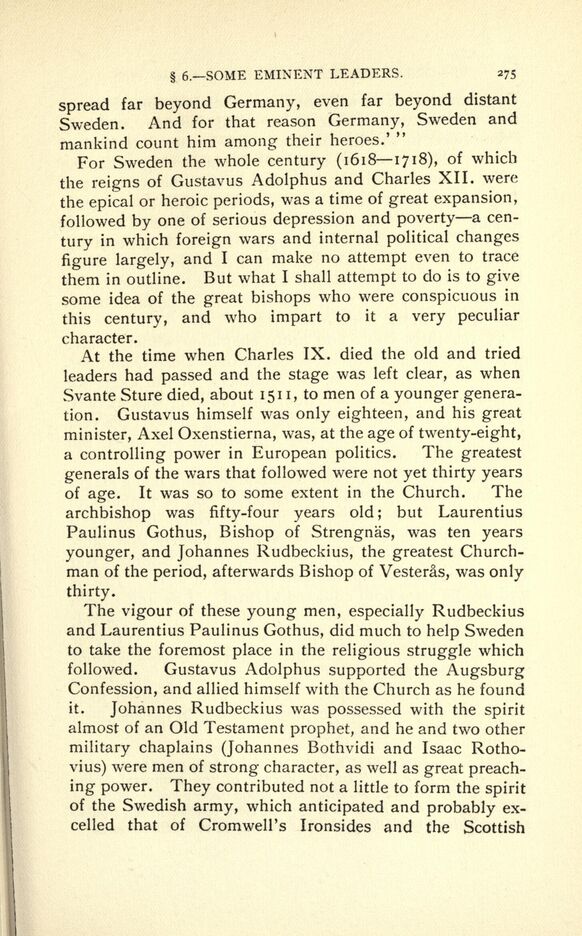
Full resolution (JPEG) - On this page / på denna sida - VI. From the Upsala-möte to the death of Charles XII. The Great Kings and the Great Bishops (1592—1718 A.D.)

<< prev. page << föreg. sida << >> nästa sida >> next page >>
Below is the raw OCR text
from the above scanned image.
Do you see an error? Proofread the page now!
Här nedan syns maskintolkade texten från faksimilbilden ovan.
Ser du något fel? Korrekturläs sidan nu!
This page has never been proofread. / Denna sida har aldrig korrekturlästs.
6. SOME EMINENT LEADERS. 275
spread far beyond Germany, even far beyond distant
Sweden. And for that reason Germany, Sweden and
mankind count him among their heroes.
For Sweden the whole century (16181718), of which
the reigns of Gustavus Adolphus and Charles XII. were
the epical or heroic periods, was a time of great expansion,
followed by one of serious depression and poverty a cen
tury in which foreign wars and internal political changes
figure largely, and I can make no attempt even to trace
them in outline. But what I shall attempt to do is to give
some idea of the great bishops who were conspicuous in
this century, and who impart to it a very peculiar
character.
At the time when Charles IX. died the old and tried
leaders had passed and the stage was left clear, as when
Svante Sture died, about 1511, to men of a younger genera
tion. Gustavus himself was only eighteen, and his great
minister, Axel Oxenstierna, was, at the age of twenty-eight,
a controlling power in European politics. The greatest
generals of the wars that followed were not yet thirty years
of age. It was so to some extent in the Church. The
archbishop was fifty-four years old; but Laurentius
Paulinus Gothus, Bishop of Strengnas, was ten years
younger, and Johannes Rudbeckius, the greatest Church
man of the period, afterwards Bishop of Vesteras, was only
thirty.
The vigour of these young men, especially Rudbeckius
and Laurentius Paulinus Gothus, did much to help Sweden
to take the foremost place in the religious struggle which
followed. Gustavus Adolphus supported the Augsburg
Confession, and allied himself with the Church as he found
it.
Johannes Rudbeckius was possessed with the spirit
almost of an Old Testament prophet, and he and two other
military chaplains (Johannes Bothvidi and Isaac Rotho-
vius) were men of strong character, as well as great preach
ing power. They contributed not a little to form the spirit
of the Swedish army, which anticipated and probably ex
celled that of Cromwell s Ironsides and the Scottish
<< prev. page << föreg. sida << >> nästa sida >> next page >>